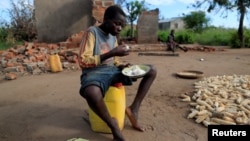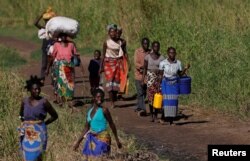The U.N. World Food Program (WFP) says it plans to scale up its emergency food and nutritional operation in Mozambique to reach 1.7 million people in four provinces hardest-hit by the recent Cyclone Idai.
The World Food Program says it has distributed food to one million people in Mozambique since Cyclone Idai devastated the country more than one month ago.
Agency officials say people affected by the cyclone and ensuing flood are receiving up to 30-day rations of rice and maize meal, pulses (edible seeds) and other staples.
WFP spokesman Herve Verhoosel said nutritionists have been deployed to the four priority provinces and have begun treating children and women suffering from moderate acute malnutrition. He told VOA the plan is to treat at least 100,000 people with that condition over the next six months.
He added that a cholera outbreak also has had an impact on people's nutritional condition.
"As you know, the ongoing cholera outbreak that has so far infected, I believe more than 5,000 people threatens to worsen malnutrition," he noted. "WFP is supporting three cholera treatment centers in Beira with food assistance.We are working very closely with our colleagues of WFP and the other humanitarian colleagues … to ensure that the food is provided in those centers."
Verhoosel said planting for the country's second harvest in October and November must be completed in the coming days. In preparation for that, he said the U.N.'s Food and Agriculture Organization has begun distributing maize, bean, and vegetable seeds, as well as small tools to thousands of smallholder farming families.
He said the scale-up operation is under way but requires $130 million to keep it fully running through the end of June. A good portion of the money is needed right away, he added, as the agency plans to move to a cash-based transfer system this month.
Instead of distributing food, he said the WFP will provide cash to some 145,000 beneficiaries to buy the products they need at local markets.
The storm killed nearly 1,000 people in Mozambique, Zimbabwe and Malawi, and many others are still missing.





